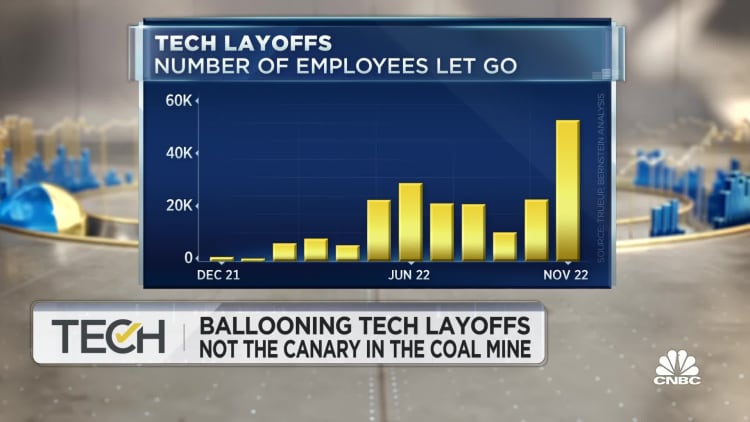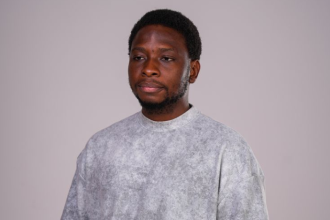Sam Altman, co-founder and chief executive officer of OpenAI Inc., speaks during TechCrunch Disrupt 2019 in San Francisco, California, on Thursday, Oct. 3, 2019.
David Paul Morris | Bloomberg | Getty Images
For his day job, Tobias Zwingmann is the managing partner of RAPYD.AI, a German consulting firm that helps clients make use of artificial intelligence. On the side, Zwingmann teaches online courses on AI.
Lately, Zwingmann has been generating lecture notes using ChatGPT, a new chatbot that’s quickly become the latest fad in tech. Zwingmann said he recently asked ChatGPT to explain the mechanisms and workings of a machine learning technology known as a DBSCAN, which is short for density-based spatial clustering of applications with noise, because he is too “lazy to write it all down.”
“I went up and said, ‘OK, tell me a detailed step by step of how the DBSCAN algorithm works,’ and it gave me that step by step,” Zwingmann said.
After a little bit of polishing and editing, Zwingmann said the lecture notes were in good shape.
“This took me like 30 minutes, and before that I would have spent the whole day,” Zwingmann said. “I can’t neglect that this has proven to be hugely beneficial.”
ChatGPT debuted in late November and has quickly turned into a viral sensation, with people tweeting questions, such as “Are NFTs dead,” and requests like, “Tell a funny joke about the tax risks of international remote work.” They include a screenshot of ChatGPT’s response, which often — but not always — makes sense.
The technology was developed by San Francisco-based OpenAI, a research company led by Sam Altman and backed by Microsoft, LinkedIn co-founder Reid Hoffman and Khosla Ventures. ChatGPT automatically generates text based on written prompts in a fashion that’s much more advanced and creative than the chatbots of Silicon Valley’s past.
In a year that’s turned into a dud for the technology sector, with mass layoffs, wrecked stock prices and crypto catastrophes dominating the headlines, ChatGPT has served as a reminder that innovation is still happening.

Tech executives and venture capitalists have gushed about it on Twitter, some even comparing it to Apple’s debut of the iPhone in 2007. Five days after OpenAI released ChatGPT, Altman said that the chat research tool “crossed 1 million users!”
Back in 2016, tech giants like Facebook, Google and Microsoft were trumpeting digital assistants as the next evolution of human and computer interaction. They boasted of the potential for chatbots to order Uber rides, buy plane tickets and answer questions in a life-like manner.
Six years later, progress has been slow. The majority of chatbots that people interact with are still relatively primitive, only capable of answering rudimentary questions on corporate help desk pages or minimally helping frustrated customers understand why their cable bills are so high.
But with early ChatGPT adopters demonstrating the technology’s ability to carry a conversation through multiple queries in addition to generating software code, the world of so-called natural language processing appears to be entering a new phase.
It’s part of the larger trend. Tech investors are pouring billions of dollars in startups specializing in the field of generative AI, which refers to the ability of computers to automatically create text, videos, photos and other media using cutting-edge machine learning technologies.
Brendan Burke, an analyst at tech industry data firm PitchBook, said a number of early-stage investors have turned their attention from cryptocurrencies and related concepts like web3 to generative AI technologies.
“That’s a trend that is perceptible,” Burke said.
According to PitchBook, the top firms in the space are Khosla, David Sacks’ Craft Ventures, Sequoia, Entrepreneur First out of the U.K. and Lux Capital. Investors have also noticed on platforms like GitHub that many web3 developers have shifted their attention from NFTs and crypto projects to open-source generative AI initiatives, Burke said.
“I think that’s a sign of some of the rethinking that’s going on throughout the early-stage market,” Burke said.
What is ChatGPT?
ChatGPT is essentially a variant of OpenAI’s popular GPT-3.5 language-generation software that’s been designed to carry conversations with people. Some of its features include answering follow-up questions, challenging incorrect premises, rejecting inappropriate queries and even admitting its mistakes, according to an OpenAI summary of the language model.
ChatGPT was trained on an enormous amount of text data. It learned to recognize patterns that enable it to produce its own text mimicking various writing styles, said Bern Elliot, a vice president at Gartner. OpenAI doesn’t reveal what precise data was used for training ChatGPT, but the company says it generally crawled the web, used archived books and Wikipedia.
OpenAI declined to comment for this story.
Elliot said that for now ChatGPT is more of a way for OpenAI to gain publicity and to show what’s possible for large language models, as opposed to a useful piece of software for businesses to incorporate. While ChatGPT is free, OpenAI sells access to its underlying language and related AI models for businesses to use.
“ChatGPT, as currently conceived, is a parlor trick,” Elliot said. “It’s something that isn’t actually itself going to solve what people need, unless what they need is sort of a distraction.”

However, Zwingmann isn’t alone in using ChatGPT for more advanced purposes.
Cai GoGwilt, the chief technology officer of digital contract management startup Ironclad, said his company is exploring how ChatGPT could be used to summarize changes to legal documents. The feature would be helpful for the startup’s legal clients, who routinely alter documents and then notify their colleagues after they made the changes, GoGwilt said.
GoGwilt said ChatGPT offers “more creative” responses compared to similar language models developed by big tech companies. Meta’s AI language tool, dubbed RoBERTa, seems more capable at categorizing and labeling text, GoGwilt said, adding that his company uses both GPT and RoBERTa to power certain features in its digital document software.
At legal research and data company LexisNexis, Min Chen, a vice president, said in an email that she and her team are just starting to test ChatGPT although they already use OpenAI’s GPT-3 software through Microsoft’s Azure cloud.
Chen said GPT-3 is more suitable for LexisNexis because it’s an enterprise product and can be customized. However, her team has been experimenting with ChatGPT and she said it sometimes generates “sensible answers” that are “very impressive.” Still, it has its flaws.
“I am afraid it’s not reliable enough as a decision-making tool for serious legal research,” Min said. “In some cases, ChatGPT will give a very verbose answer that seems to make sense, but the answer is not getting the facts right.”
There’s also the bias problem, which is true for many kinds of AI-powered software.
As Mozilla senior fellow Abeba Birhane shared on Twitter, ChatGPT produced song lyrics that implied women who wear lab coats are “probably just there to clean the floor,” whereas men wearing lab coats “probably got the knowledge and skills you’re looking for.”
Regarding ChatGPT’s limitations, OpenAI said in a blog post that while the firm is working to mitigate bias problems, the software “will sometimes respond to harmful instructions or exhibit biased behavior.”
Altman said in a tweet over the weekend that ChatGPT is “incredibly limited” and “it’s a mistake to be relying on it for anything important right now.”
Krishna Gade, CEO of AI model monitoring startup Fiddler, said ChatGPT and related language technologies could lead to big “disruptions in web search,” an area long dominated by Google.
Gade, who previously worked at Microsoft’s Bing search unit, said if ChatGPT’s popularity continues to grow along with other chat-based tools that answer questions, Google may have to update its core search technology to more prominently center on chat.
ChatGPT’s rising popularity shows there is a segment of the population that prefers getting information via question and answers as opposed to a typical search query.
Google parent Alphabet has plenty of AI talent and has helped develop some of the core AI technologies used to create systems like ChatGPT. The search engine is also a habit that’s very difficult to displace.
As Zwingmann notes, Google still has a major advantage over ChatGPT.
“The way it works currently is people use ChatGPT and then go to Google to verify the results,” Zwingmann said, with a laugh.
Here’s what happened when we typed in, “Write me a news story about ChatGPT in the style of CNBC.”
As of December 13, 2022, ChatGPT, the new language processing AI from OpenAI, is making waves in the tech industry. The advanced model, which is trained to generate human-like text, is already being hailed as a game-changer for businesses that rely on natural language processing.
ChatGPT’s ability to understand and respond to a wide range of topics has been particularly impressive, with some even suggesting that it has the potential to revolutionize the way we interact with technology. Many experts believe that ChatGPT’s advanced capabilities will be a valuable asset for companies in fields such as customer service, online education, and market research.
One of the key advantages of ChatGPT is its ability to learn and adapt quickly to new information. This means that it can be trained to handle new topics and tasks without the need for extensive retraining. Additionally, ChatGPT is highly scalable, which makes it well-suited for use in large-scale applications.
So far, the response to ChatGPT has been overwhelmingly positive, with many praising its advanced capabilities and ease of use. It remains to be seen how ChatGPT will be used in the coming years, but it’s clear that it has the potential to be a major player in the world of natural language processing.
WATCH: Silicon Valley’s betting big generative-AI companies-here’s why






